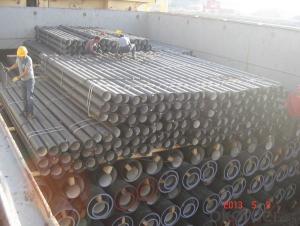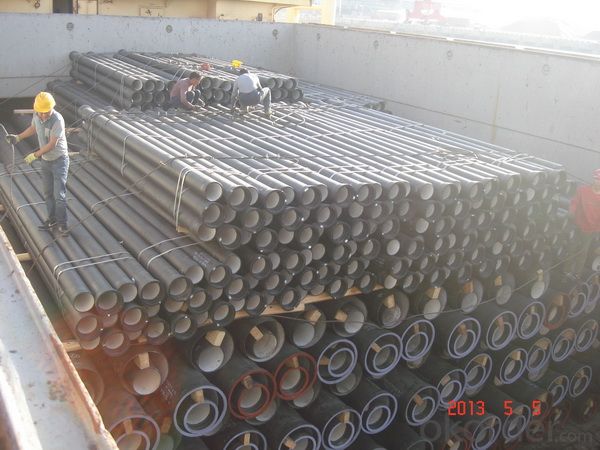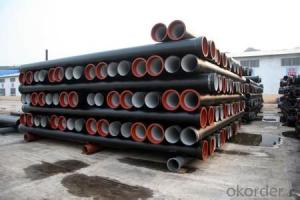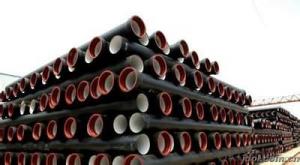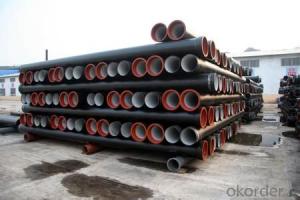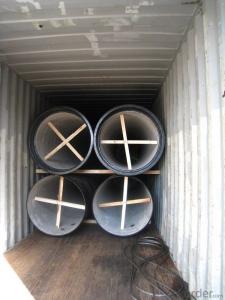DUCTILE IRON PIPE DN125 c class
- Loading Port:
- Tianjin
- Payment Terms:
- TT OR LC
- Min Order Qty:
- -
- Supply Capability:
- 30000Tons m/month
OKorder Service Pledge
OKorder Financial Service
You Might Also Like
CNBM ductile iron pipe ranges from DN80-DN1600mm (T-Type, Class K9), effective length 6m, comply with ISO2531 Standard
Company Profile
CNBM International Corporation is the leading production base and renowned supplier of Ductile Iron Water Pipe systems of both potable and waste water in China. We are constantly looking to develop high quality products to ensure the longest service life and wonderful performance.
CNBM Pipelines regard quality as the essential factor leading to successful business. Every pipe is tested in accordance with BS EN545 (water application) or BS EN598 (sewer application). CNBM Pipelines products comply with and are tested according to the relevant European and International Standards. Our pipes are manufactured under the quality management system BS EN ISO 9001. After years of efforts, CNBM Pipelines has built up great reputation in terms of quality and service among customers worldwide
Product Introduction
CNBM ductile iron pipe ranges from DN80-DN1600mm (Tyton, T-Type, Class K7/K8/K9), effective length: 6m, complying with BS EN545/EN598/ISO2531/BS4772.
Specification& Payment terms
Internal lining: Pipes shall have an internal cement mortar lining in acc with ISO4179.
External coating: Pipes shall be externally coated with metallic zinc spray plus a further layer of resin painting to ISO8179.
Gasket: 100% SBR/NBR/EPDM gasket in accordance with ISO4633.
Packing: Pipes from DN100 to DN300 be bundled with steel belts, the others are in bulk.
Payment term: By 30% T/T advance payment + 70% Irrevocable L/C at sight.
Packing: In bulk vessel or in container.
- Q: The difference between HDPE pipe and ductile iron pipe
- Different appearance, ductile iron pipe single length of 6 meters, large wall thickness; mechanism cast iron pipe single length of 3 meters, the wall thickness is thin.
- Q: Can ductile iron pipes be used in contaminated groundwater systems?
- Contaminated groundwater systems can indeed utilize ductile iron pipes. Renowned for their strength and durability, ductile iron pipes are versatile and applicable in various settings, including water and wastewater systems. These pipes possess corrosion-resistant properties that safeguard against both internal and external corrosion, thus ensuring reliable water transportation, even in the presence of contaminated groundwater. When addressing contaminated groundwater, it becomes imperative to assess the extent and nature of the contamination. Ductile iron pipes exhibit resistance to numerous common chemicals typically found in groundwater, including specific acids and alkalis. However, in instances of severe or specific chemical contamination, it may be necessary to explore alternative pipe materials that offer superior resistance to those particular substances. Moreover, the proper installation and maintenance of ductile iron pipes are vital for their long-term performance within contaminated groundwater systems. Regular inspections, cleaning, and the use of suitable protective coatings can effectively mitigate any potential risks associated with contamination. In conclusion, ductile iron pipes can be effectively employed in contaminated groundwater systems, provided that the level and type of contamination fall within acceptable limits and appropriate installation and maintenance practices are observed. It is always advisable to seek guidance from experts and consider local regulations and guidelines when determining the suitability of pipe materials in specific groundwater systems.
- Q: How can the ductile iron pipes be treated with corrosion protection?
- Cement mortar lining + special coatingThe internal corrosion prevention measures are suitable for pipes conveying sewage, and the corrosion resistance of lining can be improved.
- Q: Can ductile iron pipe be used for wastewater treatment plant sludge handling?
- Yes, ductile iron pipe can be used for wastewater treatment plant sludge handling. Ductile iron pipes are known for their durability, corrosion resistance, and ability to withstand heavy loads, making them suitable for handling sludge in wastewater treatment plants.
- Q: Luo what effect of ductile cast iron
- Chromium can improve the hardness, strength and wear resistance of nodular iron, and increase bainite in bainite ductile iron.
- Q: Are ductile iron pipes suitable for wastewater systems?
- Indeed, wastewater systems can utilize ductile iron pipes. Ductile iron, renowned for its robustness and durability, exhibits resistance against corrosion and can endure the arduous conditions typically encountered in wastewater systems. Its exceptional tensile strength enables it to withstand the pressure and stress resulting from the movement of wastewater. Furthermore, the installation of ductile iron pipes is effortless, and their longevity ensures a cost-effective solution for wastewater systems. In conclusion, ductile iron pipes represent a dependable and appropriate choice for transporting wastewater in diverse applications.
- Q: Are ductile iron pipes suitable for use in cooling water systems?
- Yes, ductile iron pipes are suitable for use in cooling water systems. Ductile iron pipes have excellent strength and durability, making them resistant to the high-pressure and corrosive nature of cooling water systems. They can withstand the extreme temperature variations and provide long-lasting performance. Additionally, ductile iron pipes have good resistance to the growth of microorganisms, which is important in maintaining the quality of the cooling water. Moreover, ductile iron pipes offer ease of installation and have a low maintenance requirement, making them a cost-effective choice for cooling water systems. Overall, ductile iron pipes are a reliable and suitable option for use in cooling water systems.
- Q: The difference between ductile iron pipe and steel pipe used in pipe jacking
- Comparison between ductile iron pipe and universal cast iron pipe: the process of making ductile iron pipe is cast by adding alkaline earth metal or rare metal such as magnesium and calcium in the raw material of common cast iron pipe.
- Q: Can ductile iron pipe be used for power plant cooling water systems?
- Indeed, power plant cooling water systems may utilize ductile iron pipe. Ductile iron pipe possesses remarkable strength and longevity, rendering it appropriate for diverse applications, including cooling water systems in power plants. Its superb corrosion resistance shields it against the deleterious impacts of water and chemicals frequently present in such systems. Moreover, the smooth interior surface of ductile iron pipe reduces friction loss and enables efficient water flow. These attributes establish ductile iron pipe as a dependable and economical option for power plant cooling water systems.
- Q: What is the expected pressure class for ductile iron pipes?
- The pressure class anticipated for ductile iron pipes may differ based on the particular use and project needs. In a general sense, ductile iron pipes are engineered to manage high-pressure situations and are typically offered in pressure classes spanning from 150 psi to 350 psi. These pressure classes signify the utmost operational pressure that the pipe can endure while preserving its structural soundness. To ascertain the suitable pressure class for ductile iron pipes in a specific scenario, it is crucial to refer to industry standards, guidelines, and project specifications.
Send your message to us
DUCTILE IRON PIPE DN125 c class
- Loading Port:
- Tianjin
- Payment Terms:
- TT OR LC
- Min Order Qty:
- -
- Supply Capability:
- 30000Tons m/month
OKorder Service Pledge
OKorder Financial Service
Similar products
Hot products
Hot Searches
Related keywords
